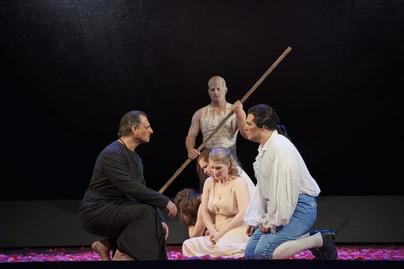 A scene from the COC's Abduction from the Seraglio. Photo: Michael Cooper.
A scene from the COC's Abduction from the Seraglio. Photo: Michael Cooper. But that didn’t happen – at least not visibly. Rather, what unfolded last Saturday (Feb. 10) at Toronto’s Four Seasons Centre was a performance that gave the audience substantially more than a frothy comedy with some brilliant singing. This Abduction gave people plenty to think about, and from what I could tell, they were fascinated with the production. And that's a good thing, because when an audience has something engaging to think about, it listens better.
Yet I can’t help wondering if the audience received the production’s message quite as Mouawad intended. While the central thesis – that Eastern and Western cultures each have their virtues, and in some ways aren’t even very different – was conspicuous in many ways, I suspect it was this Abduction’s commentary on gender relations that may have resonated more strongly. If so, this was due to an unfolding of events beyond Mouawad’s control: in the current news cycle, Christian-Muslim conflict has taken a back seat to the #MeToo movement.
When Pasha Selim tells Konstanze that he could force her to marry him, but he won’t, and then a little while later threatens her with torture if she doesn’t, who, at this moment in time, could not think of Harvey Weinstein?
A few paragraphs back, I mentioned brilliant singing. And it gives me pleasure to expand on this point. Abduction is an ensemble piece, and in keeping with this ethos, there was no real “star” of the show – but, rather, a consistently fine cast, fully committed their roles.
The women, in particular, shone brightly. As Konstanze, Jane Archibald enfolded a full range of emotions within her vocally glorious delivery. She is an ideal Mozart soprano: her voice is rich and supple, full of energy (but not in a forceful way), and strong in all registers. Soprano Claire de Sévigné, as Blonde, was also winsome, bringing a more fragile, delicate tone to her performance.
Tenor Mauro Peter’s Belmonte was a dashing, vivid figure, agile in form and voice. And, as Pedrillo, Owen McCausland filled out his role impressively.
The two principal Turks – Bassa Selim and Osman – were each, in their own way, fashioned with care, both by the director and by the singers inhabiting them. As Selim, actor Raphael Weinstock was a complex character, free of clichés and genuinely torn between a real love for Kostanze and his wish to do the right thing. Bass Goran Jurić’s Osmin was rather more two dimensional, yet always a vivid and powerful presence on the stage.
Speaking of clichés – or, rather, of their absence – the sets and costumes for this Abduction, by Emannuel Clolus and Emanuelle Thomas, respectively, were largely free of orientalisms: no gigantic turbans or grandiose mustachios, no slave-girls in harem pants and veils. Strangely, however, the zombie-like chorus, bald and dressed in rags, looked like they might have just escaped from some production of Fidelio somewhere, only to find themselves no better off.
As for the sets, they consisted of two gigantic, grey cereal box-shaped objects that were moved around the stage quite a bit (sometimes to good effect and sometimes gratuitously), and a huge grey orb that resembled a Death Star from Star Wars. They could have been the sets for anything, really – just as readily used for The Marriage of Figaro or Carmen – but they were effective contributions to the sleek, ahistorical look of the production.
Finally, kudos to the COC Orchestra and music director Johannes Debus, whose attention to detail, and sure sense of pace made this extended Abduction – over three hours long! – elegant and fluid.
© Colin Eatock 2018
 RSS Feed
RSS Feed

